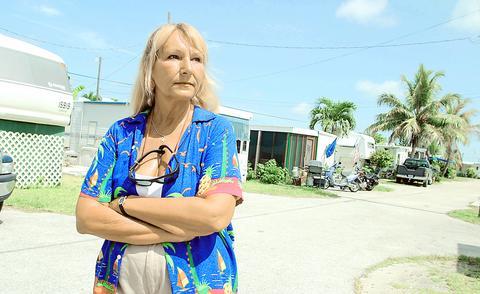To Karen Melnick, the Gulfstream Trailer Park here is a tidy community of narrow streets and close ties, where she pays less than US$500 a month rent and neighbors gather at a tiki hut to watch the sun set over the bay.
To developers in this Florida Keys city, where land is scarce, the park is a potential platform for 83 luxury apartments worth US$300,000 to US$1 million each.
So begins the battle for Gulfstream Trailer Park, as do fights for many older mobile home parks on prime real estate throughout the state.

PHOTO: NY TIMES
There are 849,000 mobile homes in Florida, the 2000 census reported, or 12 percent of the state's housing units. As the price of real estate has shot up, and suburban sprawl has reached its limits in some areas, many developers are looking at the ground beneath trailer parks as an underused resource.
That trend has Melnick and her neighbors fighting for their homes.
In February, she said, the park's owners announced that they had accepted an offer to sell the property. "They're telling us, when the developers take over, you have to go away," said Melnick, 53, who sells advertising space for three local radio stations. "This is where I thought I'd live the rest of my life. Where can you go for US$425 plus utilities? We've got nowhere to go."

PHOTO: NY TIMES
Trailer parks containing a total of 3,000 homes closed in the last three years, said Don Hazelton, president of the Federation of Manufactured Home Owners of Florida, a tenants' group that has 56,000 members. In Hazelton's own hometown, Largo, the residents of 12 parks are facing eviction, he said.
To live in a trailer park like Gulfstream, one of more than 2,600 in Florida, is to occupy a precarious niche in the housing system. Residents at Gulfstream own their homes, which cost US$10,000 to US$40,000, but rent the land. Most homes are mobile in name only, too old or anchored to survive a move. As the value of real estate skyrocketed through the 1990s, park owners found they could make more redeveloping the land for houses or condominiums or selling to redevelopers.
"I can sympathize with the park owners," said Robert Cintron, a lawyer representing the tenants of Gulfstream. "They're getting below-market rent."
At the same time, said Joshua Mothner, a commercial loan officer in Marathon, without trailer parks the Keys' essential work force -- the teachers and police officers, hotel workers and bank tellers -- could not afford to live there. The price of houses in the area begins at around US$300,000, apartment rentals at about US$1,000 a month.
"I grew up on Shelter Island and saw this happen in the Hamptons," Mothner said, referring to the Long Island communities. "You lose whole strata of the population." Some workers already have two-hour bus rides to the area, often to jobs paying US$7 an hour, said Jeff Pinkus, a Marathon councilman.
Recently, Cintron stood on an empty lot on Route 1, the highway running the length of the Keys. Until last summer, the lot had been a 45-unit mobile home park called Coral Isle. Now an attractive sign at one end advertises "Key West's Newest Gated Community," with two- and three-bedroom apartments selling for just over US$300,000 to US$450,000. When the park owners sold the property to a redeveloper, only two of the homes could be moved; the others were left like litter.
"We all scattered," said David Ray, 48, a carpenter who left his 4m by 18m mobile home behind, and is now renting a trailer nearby. Moving his home would have cost US$18,000 to US$20,000, he said.
When owners decide to sell or redevelop a mobile home park, tenants have few legal protections. If they have formed a homeowners' association and registered with the state, they have the right to match the highest offer from a prospective buyer. Owners often prefer to sell to a well-financed developer. If tenants cannot buy the property, they may be eligible for a relocation payment of up to US$6,000, depending on the size of their trailers and whether they can be moved. After an eviction notice, residents have six months to move.
At Gulfstream, Cintron said, the owners, Frank and Roseanne Mauro, announced that they had sold the park, not giving residents a chance to match the offer. On behalf of the tenants, Cintron sued to block the sale before it could be finalized, citing the rights of a homeowners' association. Tenants say they believe the sale price was US$4 million to US$4.6 million.
Frank Mauro refused to be interviewed for this article. His lawyer, William N. DeVane, did not respond to phone calls. The buyers, Southstar of Tampa, said through their lawyer, Douglas M. Halsey, that they would not comment.
At Gulfstream, residents leave their doors unlocked and spend hot afternoons in a community pool. Recently, Dee Villa-Louis, 47, showed off her air-conditioned home, a single-wide with a sunroom added on, and one of the park's popular curiosities, her hot tub. Villa-Louis and her husband, Patrick Louis, who are retired, moved to the park from Colorado last year and settled quickly into the swing of Keys life.
When she bought her home and another nearby for her parents, she said, she had no warning that the land might be sold. Neither of her trailers can be moved. If the sale goes through, she said, her $30,000 investment will be worthless.
"We'll be OK," she said, "but what's going to happen to our neighbors? A lot of the older people here are on fixed incomes. They don't want to change."
A neighbor, Donna King, said her fortunes had already been affected by the prospect of redevelopment. King, 48, is a flight attendant for US Airways who has lived at Gulfstream for seven years, she said. When US Airways declared bankruptcy last year, King made plans to move to Charlotte, North Carolina.
King paid US$8,000 for her one-bedroom mobile home here and estimates that she put another US$4,000 into fixing it up. In a competitive market, she said, she could easily sell it for US$15,000. But since word circulated that Gulfstream might be destined for the bulldozer, no one is interested in buying there.
"I don't see how you can tell someone your house is now worthless," King said.
Under present law, homeowners and buyers often have no way of knowing whether a park might come up for sale or redevelopment, said Frank Williams, executive director of the Florida Manufactured Housing Association, a trade group that represents park owners, manufacturers and dealers. "How a consumer can deduce these things, I don't know," Williams said.
Most of the parks being redeveloped, he said, were built more than 30 years ago. "The economics no longer work" for park owners, he said. If buyers see an old community suddenly being surrounded by supermarkets and upscale developments, Williams said, "a light bulb should go off," adding, "But if they're moving into a modern retirement community, the chances of change are almost nil."
There are no official statistics on park age. Al Hesselbart, a historian of manufactured housing and recreational vehicles, estimates that about half of Florida's mobile home parks are more than 30 years old. He added that many of them would not be candidates for redevelopment.
Larry Shaffer, 52, a retired Navy chief warrant officer, moved to Gulfstream in 1997, when his previous trailer park, near Tampa, was closed to make room for a Home Depot.
When the Mauros announced in February that they were selling the park, Shaffer and others began meeting in the home of Emil Kuhn, a retired veterinarian who has spent winters in the park since 1986. Though they did not have an active homeowners association, they found documents they say show that a homeowners organization had incorporated in 1982 and never disbanded.
Shaffer said the residents would have no trouble raising the money to buy the park -- roughly US$50,000 per homeowner -- and that mortgage and maintenance payments would not be much more than their current rents. The residents of a nearby trailer park, Lion's Lair, recently brought a successful suit to buy their property.
Even if the Gulfstream tenants' suit is successful, it will do little to ease the crunch for affordable housing in the Keys, said Debbie Love, president of the Middle Keys Community Land Trust, a nonprofit group formed to create and preserve affordable housing. Changes in state regulations have made it easier and cheaper for owners to evict tenants and redevelop trailer parks.
But she said public sentiment was starting to shift. Shaffer, motivated by his experience at Gulfstream, said he was resigning from the homeowners' board to run for city council, saying he wants to protect other parks. "I've been alone in the woods crying about this for years," Love said. "All of the sudden, a light has switched on."

Aug. 4 to Aug. 10 When Coca-Cola finally pushed its way into Taiwan’s market in 1968, it allegedly vowed to wipe out its major domestic rival Hey Song within five years. But Hey Song, which began as a manual operation in a family cow shed in 1925, had proven its resilience, surviving numerous setbacks — including the loss of autonomy and nearly all its assets due to the Japanese colonial government’s wartime economic policy. By the 1960s, Hey Song had risen to the top of Taiwan’s beverage industry. This success was driven not only by president Chang Wen-chi’s

Last week, on the heels of the recall election that turned out so badly for Taiwan, came the news that US President Donald Trump had blocked the transit of President William Lai (賴清德) through the US on his way to Latin America. A few days later the international media reported that in June a scheduled visit by Minister of National Defense Wellington Koo (顧立雄) for high level meetings was canceled by the US after China’s President Xi Jinping (習近平) asked Trump to curb US engagement with Taiwan during a June phone call. The cancellation of Lai’s transit was a gaudy

From Godzilla’s fiery atomic breath to post-apocalyptic anime and harrowing depictions of radiation sickness, the influence of the nuclear bombings of Hiroshima and Nagasaki runs deep in Japanese popular culture. In the 80 years since the World War II attacks, stories of destruction and mutation have been fused with fears around natural disasters and, more recently, the Fukushima crisis. Classic manga and anime series Astro Boy is called “Mighty Atom” in Japanese, while city-leveling explosions loom large in other titles such as Akira, Neon Genesis Evangelion and Attack on Titan. “Living through tremendous pain” and overcoming trauma is a recurrent theme in Japan’s

As last month dawned, the Democratic Progressive Party (DPP) was in a good position. The recall campaigns had strong momentum, polling showed many Chinese Nationalist Party (KMT) lawmakers at risk of recall and even the KMT was bracing for losing seats while facing a tsunami of voter fraud investigations. Polling pointed to some of the recalls being a lock for victory. Though in most districts the majority was against recalling their lawmaker, among voters “definitely” planning to vote, there were double-digit margins in favor of recall in at least five districts, with three districts near or above 20 percent in